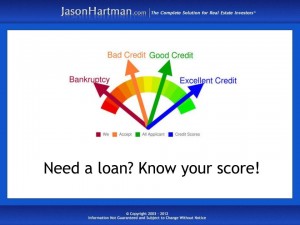Thursday, September 26, 2013
Welcome! If this is your first time visiting Jason Hartman's website, please read this page to learn more about what we do here. You may also be interested in receiving updates from our blog via RSS or via email if you prefer. If you have any questions about real estate investment feel free to contact us anytime! Thanks!  Have you pulled your free report from the Big Three credit reporting agencies (Equifax, Trans-Union, Experian) this year? Any year? Too many people don?t have the slightest inkling what their credit score is, which is a dangerous financial circumstance. In some cases, this number might be more important than those related to your blood pressure or cholesterol.
Have you pulled your free report from the Big Three credit reporting agencies (Equifax, Trans-Union, Experian) this year? Any year? Too many people don?t have the slightest inkling what their credit score is, which is a dangerous financial circumstance. In some cases, this number might be more important than those related to your blood pressure or cholesterol.
The bad news is that bad credit sucks. The good news is you can legitimately repair it, maybe not to its original unblemished shine but enough to maybe snag a decent rate on your next loan.
First of all, what is a good credit score? Here?s our breakdown:
750 and up: You?ve got no worries. Easy credit at great rates.
710 ? 750: Not top of the heap but you?ll still qualify at competitive rates.
650 ? 710: No problem getting approved but your rates won?t be the best.
580 ? 650: You?ll get credit but at higher rates and average terms.
580 and below: Loan sharks might even turn you down
Luckily, your credit score isn?t etched in stone. Here are three of Jason Hartman?s recommendations to turn an anemic number into a healthier one.
Be On Time
Timeliness of payment and credit use level counts for a full 65% of the credit score equation, so if nothing else, make your payments on time. 30 or 60 day late payments go away relatively quickly after you make restitution but it takes awhile for the sting of a 90 day late payment to fade.
How Low Can You Go?
It?s best if you use less than 35% of the credit available to you. Higher than that and lenders start to get nervous. If you plan on applying for a loan soon, do your dead level best to get down to 10% usage or less.
Talk to the Collector
Strange but true ? paying off accounts that have been sent to collection might not help your score that much. The big hit comes when it?s sent to collection in the first place. If you do decide to pay it off, get the agency to agree IN WRITING to mark the account as paid and remove it from your credit report entirely.
Lastly, keep in mind that as many as 80% of credit reports contain errors, many of which are significant enough to drop your score as much as 50 points. You should review your Equifax and Transunion records once a year for accuracy. Got good credit? Good for you! Treat it like the precious commodity it is. (Top image: Flickr | Match Financial)
* Read more from JasonHartman.com
Can New Mortgage Standards De-rail the Recovery?
5 Keys to Making the Most of Student Renters
The Jason Hartman Team

Tags: how to repair bad credit, Jason Hartman, know your credit score, The Creating Wealth Show, what is my credit score?
This entry passed through the Full-Text RSS service — if this is your content and you're reading it on someone else's site, please read the FAQ at fivefilters.org/content-only/faq.php#publishers. Five Filters recommends: